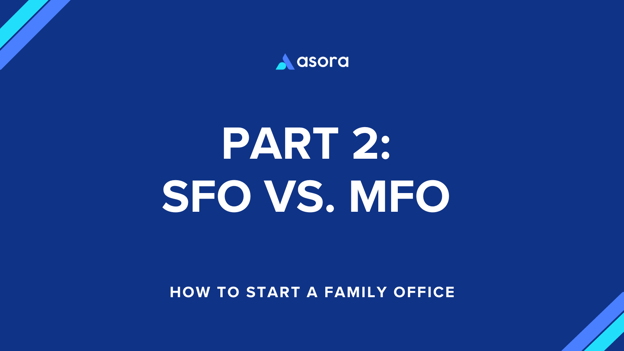As wealth accumulates across generations, affluent families often seek to preserve and grow their assets while ensuring seamless management of their financial affairs. To achieve this, many families turn to a specialised entity known as a family office. In this blog post, we will explore the concept of a family office, delve into the different types, and gain insight into the organisational structure that makes these institutions so effective.
What is a Family Office?
A family office is a private wealth management organisation that caters exclusively to high-net-worth families and ultra-high-net-worth individuals. The primary purpose of a family office is to provide comprehensive financial services, investment management, and customised solutions tailored to the unique needs and preferences of the family they serve. Essentially, it acts as a centralised hub for handling various aspects of the family's financial affairs.
How to Start Your Family Office >
Types of Family Office Structure
Single-Family Office (SFO)
A Single Family Office is exclusively dedicated to managing the financial affairs of one affluent family. This type of family office offers highly personalised and bespoke services, as it caters to the specific needs and values of the family in question. The SFO allows for direct communication and decision-making, ensuring that the family's objectives remain at the forefront of every financial strategy.
Multi-Family Office (MFO)
In contrast to the SFO, a Multi-Family Office serves multiple affluent families. By pooling together the resources of several families, the MFO offers access to a broader range of investments, services, and expertise, which might not be feasible for individual families to access on their own. This shared approach fosters cost-effectiveness and provides ample opportunities for networking and idea exchange among the families involved.
Virtual Family Office
The Virtual Family Office is a relatively new concept that combines the benefits of both SFOs and MFOs with a digital touch. Leveraging modern technologies, virtual family offices provide remote and streamlined services, allowing families to access a wide array of financial resources from anywhere in the world. This option is gaining popularity among global families seeking flexibility and convenience.

Organisational Structure of a Family Office
The organisational structure of a family office is vital for ensuring effective management of wealth and streamlined operations. Although the structure may vary depending on the specific needs and complexity of the family's financial situation, it typically consists of the following key components:
- Family Members and Family Council: The family members are at the core of the family office structure. They are the beneficiaries of the wealth being managed and play a crucial role in defining the family's financial goals, values, and legacy objectives. A Family Council may be established to facilitate communication and decision-making among family members, ensuring that everyone's voices are heard and considered.
- Chief Executive Officer (CEO) or Family Office Director: At the helm of the family office is the CEO or Family Office Director. This individual is responsible for overseeing all operations, implementing strategies, and executing the family's financial plans. The CEO acts as the main point of contact between the family and the office's various functions.
- Investment and Wealth Management Team: Comprising financial experts, analysts, and investment professionals, this team is responsible for managing the family's investment portfolio, conducting market research, and identifying suitable investment opportunities aligned with the family's risk tolerance and objectives.
- Tax and Legal Specialists: Family offices often work closely with tax and legal experts to optimise tax planning, navigate complex regulatory frameworks, and ensure compliance with all applicable laws and regulations.
- Estate Planning and Philanthropy Division: This division focuses on developing estate plans, facilitating intergenerational wealth transfer, and assisting the family in philanthropic endeavours, should they wish to create a lasting impact on society.
Family offices play a pivotal role in providing tailored financial solutions, preserving wealth, and securing a family's financial legacy for future generations. Whether through a Single-Family Office, Multi-Family Office, or the innovative Virtual Family Office, affluent families can benefit from a well-structured and expertly managed approach to their financial affairs. By understanding the different types and the importance of a solid family office structure, families can make informed decisions to secure their financial well-being for years to come.


